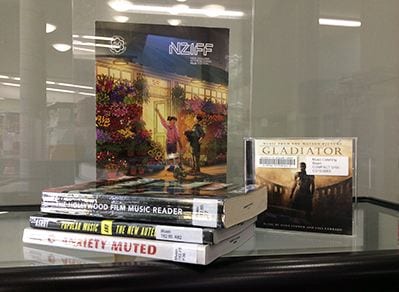
The Music and Dance Library is marking the annual New Zealand International Film Festival (19 July-12 August) with a display of film music books.
Heading along to this year’s festival? Bend your ears around the music track and listen to what it is doing. Film music isn’t just a track that exists for our listening pleasure – it’s a vital part of the picture.
In addition to being a well-trained musician, a good film composer is an excellent storyteller. Music can act as sound effects in a bar, foreshadow a crucial plot element or even provide a commentary on a character’s state of mind. Music can echo minimally throughout a narrative, delicately providing links between the scenes where it appears. On the flip side, music can bombastically assault our ears once the bad guy arrives for the big fight at the end, heightening the nail-biting tension of the scene. Whether it is the silent film piano of yesteryear or 90s hip-hop grooves, any kind of music has its place at the movies.
The Music and Dance Library has a wide-ranging collection of film music books, appealing to both the theory aficionado and those wanting a light read on such a crucial part of popular culture. You can find composer Aaron Copland talking in his own words about “Our New Music” as part of The Hollywood Film Music Reader. The music of Alfred Hitchcock is an alternate language explored in Hitchcock’s Music, a book that features references to important archival documents and interviews with some who knew the legendary director. Come to grips with how movie leitmotifs work in the chapter “Leitmotifs and Musical Reference in the Classical Film Score”, from Music and Cinema. Fans of Twin Peaks will enjoy “A Musical Tour of the Bizarre: Popular Music as Fantasy in David Lynch”, found in Popular Music and the New Auteur: Visionary Film Makers after MTV.
Marie-Claire Taylor, Music and Dance Library
